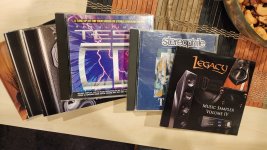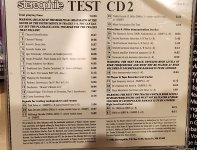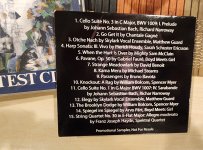Thanks for the tip! I checked out the website, and it’s a valuable resource. I’ll use it to check tracks whether they have a good dynamic range.Try using this website to make sure your recording has decent dynamic range
https://dr.loudness-war.info/album/list
Thanks for the suggestion, @deadpool!'Here's Johnny' Hocus Pocus
This list features some of the good old tracks that have been around for decades. While they were good recordings in their time, things have moved on. What's happening from recording until publication has become a lot better since then. If I am in the mood for very good quality recordings, I go to the Loudness-War website and find what I need."Audiophile Essentials: Must-Play Tracks to Test Your Hi-Fi System."
After using the DR Database for more than a decade, I've not so sure about the algorithm used in the TT DR Offline Meter (i.e., crest factor) type of loudness measurement. Since music tracks have integrated frequency spectra (averaged over a music track) that resembles pink noise, i.e.,...If I am in the mood for very good quality recordings, I go to the Loudness-War website and find what I need.
...that what these crest factor algorithms are actually telling us is really "bass crest factors", since it's mainly bass frequencies that are by far the highest amplitude on typical music tracks, and which far overshadow the higher frequency dynamic ranges measured by the tool.
How do I know this? When using a multi-band upwards expander plug-in on compressed music tracks, it becomes immediately apparent that the ratings from the TT DR Offline meter (or more specifically the foobar2000 component that does the same job), nothing changes the DR measurement even though it's easy to hear that the higher frequencies are dramatically increased in dynamic range. So the only way to measurably increase the DR Database rating of these music tracks is by increasing the bass dynamics expansion, since the higher frequencies are almost always at a much lower overall amplitude (i.e., SPL).
Years ago, I once had a fellow audio enthusiast (and a wannabe music mastering person) chastise me--quite harshly and unstintingly--on another audio forum for proposing that higher value DR Database tracks/albums were the prime way to measure a music track's actual dynamic range (objectively and subjectively). He talked about "inner dynamics" of the track, and how modern mastering practices retain "micro-dynamics".
At that time about 12 years ago, I simply brushed off his online attacks as him being subject to a sort of Stockholm Syndrome of Loudness War mastering practices, since he had no way to measure, subjectively demonstrate, or explain the root cause of his strongly worded (and quite strongly ad hominem) rebuttal.
However much more recently, after playing with the multiband expander/compressor to re-expand the dynamics of released CD tracks, I found what I described in my second sentence, above. You can dramatically improve the "inner dynamics" of a music track and still not affect overall DR Database ratings (nominally in dB crest factor) if you're working in higher frequency bands and basically leaving bass frequencies alone. You can also see it demonstrated within the plug-in dynamic displays of average amplitudes jumping up and down while the track plays--as a function of frequency.
JMTC. (And apologies to the OP for a slightly off-topic discussion excursion.)
Chris
Last edited:
I suppose this topic begs the question 'why test my system in the first place'; maybe it's 'music to help selecting or tweaking components?
To play 'devil's advocate', once you have your system, why 'test' it unless you want to find fault with it? Not because someone on YouTube, or a company that sells upgrades etc tells you you have the wrong components, cables, etc the purchase of which will 'dramatically improve' the sound.
We have had the same receiver, turntable, cartridge and CD player for many years, only the speakers have changed, they're all DIY now. Courtesy of the kind and helpful designers and reviews, I knew they would sound good before I built them, and without exception have been happy. The only testing I did was to mess about with stuffing and placement.
However, the last pair I built were an experiment and I swapped around a few components in the crossover using my 'test music' CD, which was a most worthwhile exercise.
If the receiver croaks, which it will some day, we have a spare which sounds good. If that croaks, then there's the issue of how to audition a new one. The old breed of hi-fi stores like Encel has gone, so you can't take your own speakers or other components with you to see how they sound with the new bits. Oz stores don't have an 'on approval' option, so if you buy something you're stuck with it.
Geoff
To play 'devil's advocate', once you have your system, why 'test' it unless you want to find fault with it? Not because someone on YouTube, or a company that sells upgrades etc tells you you have the wrong components, cables, etc the purchase of which will 'dramatically improve' the sound.
We have had the same receiver, turntable, cartridge and CD player for many years, only the speakers have changed, they're all DIY now. Courtesy of the kind and helpful designers and reviews, I knew they would sound good before I built them, and without exception have been happy. The only testing I did was to mess about with stuffing and placement.
However, the last pair I built were an experiment and I swapped around a few components in the crossover using my 'test music' CD, which was a most worthwhile exercise.
If the receiver croaks, which it will some day, we have a spare which sounds good. If that croaks, then there's the issue of how to audition a new one. The old breed of hi-fi stores like Encel has gone, so you can't take your own speakers or other components with you to see how they sound with the new bits. Oz stores don't have an 'on approval' option, so if you buy something you're stuck with it.
Geoff
The only kind of music that can be used to assess a system's accuracy is minimally-miked recordings of acoustic instruments. These can be orchestras, small ensembles, or solo instruments. Nature sounds and spoken words are also good tests. The important feature is that the sound was natural and captured with two microphones.
The test is whether a system can disappear. This works because everyone recognizes natural sounds.
In contrast, processed recordings and electronic instruments are not useful because they can sound like anything.
Incidentally, I recently watched some videos of walking down Canal Street in New York City. Some had good enough sound to make me feel like I was walking down a busy city street.
Ed
The test is whether a system can disappear. This works because everyone recognizes natural sounds.
In contrast, processed recordings and electronic instruments are not useful because they can sound like anything.
Incidentally, I recently watched some videos of walking down Canal Street in New York City. Some had good enough sound to make me feel like I was walking down a busy city street.
Ed
"In contrast, processed recordings and electronic instruments are not useful because they can sound like anything"
The last thing I'd want is for a system which realistically reproduces the sound of a live rock show, as they almost invariably sound bad: be it from poor acoustics, too loud, bad PA etc.
Live amplified sound can sound 'natural', if the equipment is of good quality and well implemented: I remember a jazz concert by the Don Burrows Quartet at our long-lost Dallas brooks Hall which sounded just like a big stereo and, more recently, a Hendrix tribute show by Nigel Kennedy which sounded just right.
Even when you think about orchestral /concert hall sound, it's not that simple: some halls have dull acoustics, so I wouldn't want the recording or system to reproduce that either.
Some of the best sounding orchestral and opera recordings were from HMV, RCA 'Living Stereo ' and Mercury 'Living Presence' labels in the late 1950s/early 1960s; I think the RCA and Mercury engineers usually used three microphones.
Geoff
The last thing I'd want is for a system which realistically reproduces the sound of a live rock show, as they almost invariably sound bad: be it from poor acoustics, too loud, bad PA etc.
Live amplified sound can sound 'natural', if the equipment is of good quality and well implemented: I remember a jazz concert by the Don Burrows Quartet at our long-lost Dallas brooks Hall which sounded just like a big stereo and, more recently, a Hendrix tribute show by Nigel Kennedy which sounded just right.
Even when you think about orchestral /concert hall sound, it's not that simple: some halls have dull acoustics, so I wouldn't want the recording or system to reproduce that either.
Some of the best sounding orchestral and opera recordings were from HMV, RCA 'Living Stereo ' and Mercury 'Living Presence' labels in the late 1950s/early 1960s; I think the RCA and Mercury engineers usually used three microphones.
Geoff
Last edited:
This is true. Studio rock recordings never sound like a live performance. Rock music is made possible by electronics.GeoffMillar said:The last thing I'd want is for a system which realistically reproduces the sound of a live rock show, as they almost invariably sound bad: be it from poor acoustics, too loud, bad PA etc.
That is not my experience. PA systems impart their sound. I am looking for the sound of no electronics.GeoffMillar said:Live amplified sound can sound 'natural', if the equipment is of good quality and well implemented
Three microphones are not as bad as twenty.GeoffMillar said:I think the RCA and Mercury engineers usually used three microphones.
Ed
I know nearly all this music, what the recordings have in common is that they weren't hammered flat in the recording studio, also the number of instruments played simultaneously is limited.
Intelligibility of vocals and recognizability of instruments, are two usable property's for assessing recording quality.
Intelligibility of vocals and recognizability of instruments, are two usable property's for assessing recording quality.
Last edited:
In my humble opinion test tracks to test your hifi should be predominantly based on acoustic instruments. We know how voice and acoustic instruments sound. Offcourse there are various makers of violins and pianos with indiviual sound, but everyone knows how human voices sound or acoustic guitar.
However, electric guitar can have pretty much any sound, whatever guitarist envisions, just like keybords and synthesizers.
I think thread starter completely missed this point. Selecting likeable flashy boom-ting recordings is not best aproach to test your hifi.
See example how many classical recordings are used in test cd's.
However, electric guitar can have pretty much any sound, whatever guitarist envisions, just like keybords and synthesizers.
I think thread starter completely missed this point. Selecting likeable flashy boom-ting recordings is not best aproach to test your hifi.
See example how many classical recordings are used in test cd's.
Attachments
Why would "complex classical music" be different then rock/pop for that purpose? The "complex" is just an anthropomorphic idea. It is not because we think of that music as being "complex" and "difficult" and "multi-layered" that it is for an amplifier or speaker. For an amplifier/speaker, it is just a changing voltage over time whatever is causing those changes. It could just as well be an AI constructing a waveform than 100 people playing instruments.
Thanks for sharing your article. I think I will have myself a listening session soonHi everyone, I wrote a Medium article titled "Audiophile Essentials: Must-Play Tracks to Test Your Hi-Fi System." It features a list of tracks perfect for testing the quality of your audio setup. Whether you're tuning a new setup or simply wanting to appreciate the nuances of your high-fidelity system, these tracks offer a range of frequencies, dynamics, and complexities that will truly showcase your system's capabilities. Check it out and share your thoughts!
Read it here: https://medium.com/@rasansmn/audiop...tracks-to-test-your-hi-fi-system-1cde41ca756b
Looking forward to your thoughts and recommendations!
I was once in a small bar in a foreign country. As we waited for our beers, we heard on the radio "Dust in the Wind," "Rocket Man," and "Thriller." I said to my wife, "We've been here 15 minutes and we still haven't heard, "Hotel California." Oh yea, it was the next song played. Why would I ever want to here these songs again? EVER!?
A classical music recording made with two microphones captures the sound of the orchestra and the concert hall. When played on a good system, this kind of recording makes the listener feel like he/she is in the concert hall... the electronics disappear.Havoc said:Why would "complex classical music" be different then rock/pop for that purpose?
In principle, a rock band could be recorded in the same way, but it will sound like a garage band. Rock music is invariably multi-miked, mixed, EQ'ed, reverb'ed, and compressed.
Ed
It's only lo-fi for me if a system can't play this back at fun levels without turning the bass down and only if it can carry the sparkle and pop of the fireworks of echos dropping over the dub half of the track from 4mins in
This track says "Don't test me", anyone game to push this on your system?
But also lo-fi if cant do this large mix of different drums at large clean output and keep it all tidy.... the CD is amazing and huge in the car
This track says "Don't test me", anyone game to push this on your system?
But also lo-fi if cant do this large mix of different drums at large clean output and keep it all tidy.... the CD is amazing and huge in the car
- Home
- General Interest
- Music
- Must-Play Tracks to Test Your Hi-Fi System


